South Sudan fighting forces 100,000 to flee, says U.N
April 20, 2017 (JUBA) – About 100,000 people have been displaced in the wake of the recent violence that occurred in South Sudan’s Jonglei state region, a top United Nations official said.

“The guns have to fall silent, the humanitarian situation will continue to deteriorate,” he told reporters in the capital, Juba on Wednesday.
According to Owusu, for U.N humanitarian agencies to assist the 3.5 million people displaced by the conflict that started in 2013, “the guns have to fall silent and the cessation of hostilities must hold.”
“While humanitarians [agencies] will continue to do all that is possible to alleviate suffering, the fact remains that unless the guns fall silent, the humanitarian situation will continue to deteriorate,” he said.
At least 7.5 million of the estimated 12 million South Sudanese will need assistance in 2017, the U.N humanitarian respond plan showed.
The U.N relief chief said the new clashes in different parts of the country including Wau Shilluk in Upper Nile Region, Wau in Western Bahr El Ghazal and Kajo-Keji in Central Equatoria have triggered new waves of displacements of thousands of people.
“Food insecurity and malnutrition is a serious challenge and have reached unprecedented levels in this country,” said Owusu, adding that “hundreds of thousands of people are facing starvation and a million more are on the brink of famine across the country.”
Famine was declared in Unity State’s Mayendit and Leer countries in February. At least 100,000 people in the home region of Former First Vice President and leader of the armed SPLM in Opposition (IO), Riek Machar, could starve to death due to lack of food. UN agencies said some food was delivered in March to the area.
But in some parts of the country, however, humanitarian workers reportedly had to withdraw due to difficult and dangerous environment and humanitarian workers are “paying with their lives”.
82 aid workers, the U.N said, have been killed since December 2013, including the three humanitarian contractors killed in Wau last week.
“Aid workers are often harassed across the country and humanitarian compounds and supplies have been looted and vandalized, and most recently in Jonglei, in Kajo-Keji, Yei, Wau Shilluk and in Mayendit – all these happened between February and March,” stressed the U.N official.
“The humanitarian challenges that we are dealing with are the consequences of the failure of politics to reconcile differences and to address grievances. We must fix the politics, all parties must step up efforts towards the political solution to help lessen the humanitarian case-load,” he further observed.
Conflict broke out in December 2013 following months of internal wrangling in the ruling SPLM party over leadership, vision of the party, reforms and democracy. The three-year-old war has killed thousands of people and displaced 1.6 million people as refugees to neighboring countries. Also, an estimated 1.9 million others are internally displaced in the country, with about 200,000 civilians sheltering at the U.N protection of civilians’ sites situated in government-controlled towns.
(ST)
